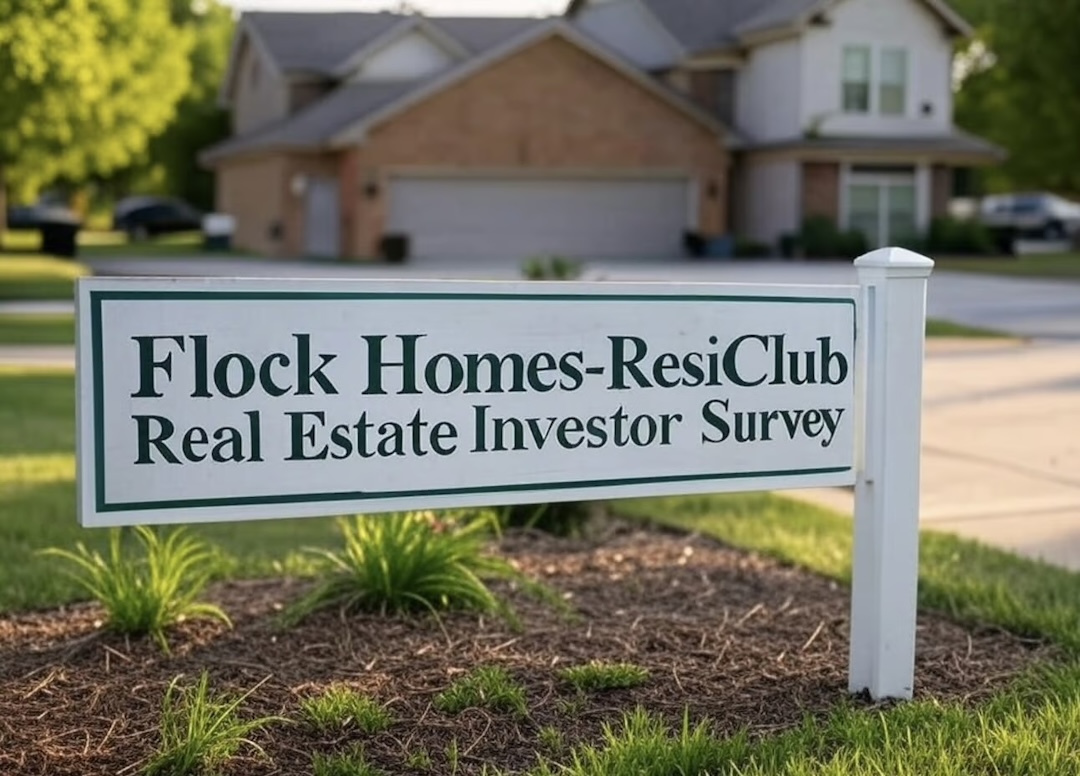The New SFR Landscape: Critical Insights from Our 2025 Real Estate Investor Survey

Single—family rental (SFR) real estate investors face a challenging marketplace in 2025, navigating rising costs, economic uncertainty, and changing regulatory environments. To track these industry shifts, we partnered with ResiClub for the Flock Homes—ResiClub 2025 Real Estate Investor Survey, polling 245 rental property owners nationwide between March 31 and April 7 on their investment strategies, concerns, and outlook.
Our findings build upon our inaugural Flock Homes—ResiClub survey, conducted in October of last year. While that poll identified the beginning of a cautious trend, with 51% of investors focused on maintaining or exiting their investment portfolios, that number has now increased to 65%. Insurance concerns have intensified as well, with more real estate investors reporting dramatic premium increases compared to just six months ago.
The data paints a picture of a rental property market where caution continues to replace the aggressive acquisition strategies of recent years. Below, we highlight four critical charts that tell the story of today's single—family rental investment landscape.
1. Portfolio Strategy: A Market in Defensive Mode
In the current rental real estate market, caution appears to be the prevailing sentiment. The majority of SFR investors are focused on maintaining their current portfolio size rather than pursuing growth. A significant minority still seek expansion opportunities, while a small fraction are actively planning their exit strategies.
This defensive posture represents a significant shift from the aggressive expansion strategies from a few years ago. Real estate investors who previously jumped at acquisition opportunities are now taking a more measured approach, prioritizing stability over growth. Since our last survey, we've seen an increase in those adopting a more conservative stance toward their rental property portfolios.
The relatively small percentage of investors looking to exit entirely suggests that despite challenges, most landlords still see long—term value in real estate as an asset class. However, the marked decrease in those actively seeking to expand their investment portfolios indicates concern about current market conditions and future profitability.
2. Rising Insurance Costs: The Silent Portfolio Killer
The survey reveals a troubling trend in property insurance, with nearly a quarter of investors reporting their premiums have increased by more than half over the past five years.
This represents a fundamental shift in the economics of rental property ownership. What was once a predictable expense has become a volatile cost center that can erode cash flow and diminish returns. The dramatic increase reflects several factors: climate change—related risk reassessments, inflation in building materials and labor, and insurance companies repricing risk after significant losses in recent years.
These rising costs are particularly challenging for smaller investors who operate on tighter margins and lack the negotiating power of institutional landlords. For many, these premium increases are proving impossible to fully pass on to tenants in markets with competitive rental environments, directly impacting bottom—line profitability.
3. Most Underestimated Risks: The Reality Check
Investors identified unexpected maintenance costs as the most commonly underestimated risk in rental property investing, followed closely by tenant—related issues. These two categories dominate investor concerns about hidden risks in the business.
These responses reflect the gap between the idealized passive income promise of real estate investing and the operational realities faced by landlords. Despite the maturation of the SFR market as an institutional asset class, property management remains fundamentally challenging, with expenses that are difficult to predict and tenant relationships that require significant time and emotional investment.
The high ranking of maintenance costs suggests that many investors enter the market with unrealistic expectations about the true cost of property upkeep, especially as housing stock ages and building materials costs rise. The prominence of tenant—related concerns indicates that even in a professionally managed portfolio, the human element of landlording remains a significant source of stress and unpredictability.
4. Investment Goals: Cash Flow Remains King
When asked about their primary investment objectives, the survey reveals a clear hierarchy of priorities for real estate investors. Cash flow maximization dominates investor thinking, with more than half placing it as their top goal. Long—term appreciation comes in as a distant second, while minimizing management time and effort ranks third.
The overwhelming preference for cash flow reflects the evolution of real estate investing from a speculation—driven approach to an income—focused strategy. In today's environment of economic uncertainty and compressed appreciation potential, investors are prioritizing the tangible returns they can generate month—to—month over less certain long—term gains.
Investors also showed a clear desire to reduce the time spent on property management. This information helps explain the growing interest in solutions like Flock's 721 Exchange, which enables property owners to contribute their rentals into a diversified portfolio in exchange for operating partnership units. Unlike a traditional 1031 Exchange, which requires identifying and managing a new property, the 721 Exchange offers continued real estate exposure, strong cash flow, and passive ownership—without the hassle of active management or strict reinvestment timelines.
Conclusion
Our 2025 Flock Homes—ResiClub Real Estate Investor Survey reveals a real estate investment community navigating significant headwinds. Rising costs, regulatory concerns, and economic uncertainty have prompted a shift toward more conservative portfolio management. Despite these challenges, most real estate investors remain committed to rental property as a preferred investment vehicle.
For those seeking alternatives to active property management, Flock offers a solution through the 721 Exchange. This tax—deferred strategy allows rental property investors to maintain real estate exposure and passive income while fully eliminating landlord responsibilities. We've helped numerous clients utilize the 721 Exchange effectively, enabling them to simplify their financial lives without sacrificing investment returns or triggering capital gains taxes.
The 721 Exchange is particularly valuable in today's market environment, where insurance costs are rising, maintenance expenses are unpredictable, and regulatory burdens are increasing. By exchanging your investment property for shares in a professionally managed portfolio, you can continue enjoying the benefits of real estate ownership without the day—to—day challenges highlighted in our survey.
Additional Insights
Our survey explored a wide range of topics shaping today’s real estate investment landscape—from what investors would change about being a landlord to the impact of tax increases on their strategies. You can dive into the full results and all 14 charts illustrating the current state of single—family rental investing here.
To learn more about how Flock Homes can support your real estate investment goals through the 721 Exchange, visit us here.
.svg)
.avif)



.png)

.svg)